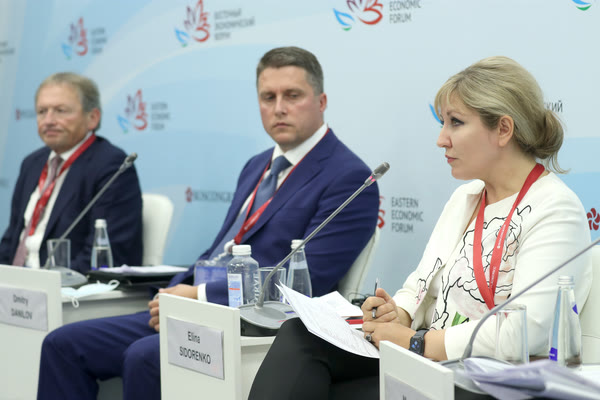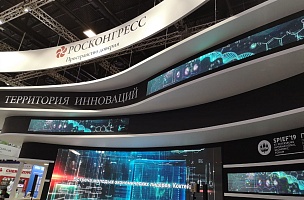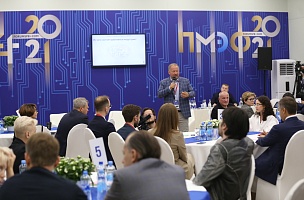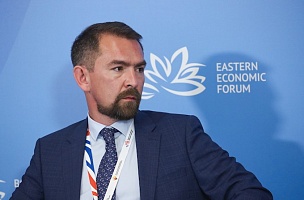KEY CONCLUSIONS
Conditions to support private investment and uphold the economy are being widely created in Russia
“Our government is taking decisive steps to uphold the economy and create lasting conditions to support private investment. Based on the tasks defined by the country’s leadership, a set of measures is being implemented to enhance the business climate. The regulatory framework is being improved in the most important and problematic areas of government regulation. Institutions and infrastructure are being created for the development of investment activity. The best practices to support entrepreneurship are being introduced, including mechanisms for direct financial assistance, concessional lending, tax incentives, and moratorium on government inspections. Special advantages are provided for investors in the Russian Far East; according to the head of the state, its advancement is a national priority for the entire 21st century,” Dmitry Danilov, Head of the Department of Supervision over Execution of Federal Legislation, The Prosecutor General’s Office of the Russian Federation.
“Russia 20 years ago and Russia today are two different countries. American companies working here [note that Ed.] the rules of the game are clearer, the overall situation is much more stable. There is progress and there is much to hope for. <…> But when major business risk comes along with personal risk of criminal prosecution, entrepreneurs choose to stay away. Another thing is, there are examples of how easily private property can be lost. There is a possibility for a different, protective approach: to subject to arrest and confiscation of property only in the rarest of cases. If the prosecutor’s office could look into it and bring such precedents to a minimum, the investment climate in Russia could benefit from it,” Alexis Rodzianko, President, American Chamber of Commerce in Russia.
Products manufactured in the Far East should take up a larger share in the trade turnover between Russia and other countries
“Based on its possibilities, the Russian Far East should occupy a larger share [in trade, Ed.] than it does now. <…> With the overall growth of prices for goods and services – 30% to 50% price increase for goods, nearly two- or threefold increase for services – we see that logistics is changing dramatically in the Asia-Pacific. Imports have already increased by 40% and transit has grown by 46%. The cost of freight for a standard shipping container in the region is 7 to 8 thousand, to Africa it is 13 to 15 thousand. It is much more cost-efficient to ship around here. <…> At the Customs Service, we try to respond as flexibly and quickly as possible to new requests and proposals from participants in foreign trade,” Vladimir Ivin, Deputy Head, Federal Customs Service of the Russian Federation.
PROBLEMS
Entrepreneurs have little trust in the government due to its excessive control and supervision
“In the Far Eastern Federal District, we see that indeed, exciting and breakthrough solutions were applied, quite favorable conditions for investors were created, ASEZs and the Free Port of Vladivostok were established; however, the basis of trust is how these promises are implemented. Sadly, not all of them are 100% fulfilled. For example, good investment terms were put in place, but they only worked halfway. <…> Another problem has arisen now <…> in terms of salaries. Those who became ASEZ residents have always paid taxes on salaries at a reduced rate of 7.6% in social security payments. <…> Now even these incentives have been removed. <...> All the years they paid at a 7.6% rate, now they must pay 30%, and on top of that the authorities now attempt to collect social security contributions for the previous years,” Boris Titov, Presidential Commissioner of the Russian Federation for the Protection of Entrepreneurs’ Rights.
“The red tape in the investigation of criminal cases, which they now try to curb. Our record holder is an entrepreneur in the Far East who went through five years of ordeal after a criminal case had been opened against them. <…> We sometimes come across a catch twenty-two situation when seizure of property is applied as an interim measure. <…> One entrepreneur in the Far East had fish products confiscated from him, but then the criminal case was dropped. <…> He says: ‘Now give me my fish back.’ ‘Sorry, they forgot to plug the refrigerator into the outlet.’ As a result, loads of valuable salmon were lost,” Elina Sidorenko, General Director, Platform for Working with Entrepreneurs’ Enquiries.
SOLUTIONS
Building feedback mechanisms between supervisory authorities and businesses, reforming means of control and supervision
“The prosecution bodies possess a unique authority to remove artificial barriers for businesses and to increase investment appeal, both in particular regions and in Russia as a whole. We pay much attention to open and honest dialogue with the business community. We value this feedback, because as we receive first-hand information, we get a chance to select the most effective response to violations of the law and to prevent them in a timely fashion. <…> We are actively introducing new forms of communication with businesses. Over a year and a half, the Prosecutor General has held five public receptions in several parts of the country. At those events, entrepreneurs filed their complaints about outstanding payments, unlawful refusals in financial assistance from the regional authorities, and unfounded inspections. Similar public receptions are also arranged by chief prosecutors of the Russian regions. They are attended by representatives of leading business associations. All reported incidents of suppression of entrepreneurs’ civic rights receive our immediate attention; we investigate and take measures to restore those rights,” Dmitry Danilov, Head of the Department of Supervision over Execution of Federal Legislation, The Prosecutor General’s Office of the Russian Federation.
“On 1 July, a new legislation [on the means of control and supervision, Ed.] came into force. It covers a variety of issues concerning the digitalization of supervisory activity, as it was important to get all the systems ready. These are large-scale changes to the former unified register of inspections. There is a tremendous potential embedded in this law, which all of us are going to use in the interest of protecting the rights of entrepreneurs. <…> The old-school practice of inspection every three years is left behind. In the future, no inspections will be performed in low-risk entities. Prevention should become key in the interaction between authorities and entrepreneurs,” Alexey Khersontsev, State Secretary — Deputy Minister of Economic Development of the Russian Federation.
Holistic approach to supervision, reducing the number and timeframe of inspections, introducing additional measures of immediate response to corruption
“We reduce the number of inspections and report on their effectiveness. Even compared to last year, when the moratorium was in place, the number of inspections has decreased this year. We initiate an inspection when we are confident that there is something to inspect. Our performance indicators have improved by 1.6 times: up to 99.9%, in cooperation with the tax service and business communities. Sometimes we need to meet the business halfway and initiate a case so that we ensure the rule of law for everyone, so that no one gets special treatment and receives unfounded benefits while operating in the market,” Vladimir Ivin, Deputy Head, Federal Customs Service of the Russian Federation.
“We are interested in creating additional guarantees for businesses and introducing a kind of ‘Far Eastern immunity’ for residents of ASEZs and the Free Port of Vladivostok, to spare the entrepreneurs from planned inspections over the next five or even ten years. We mainly need preventive control. Second thing is, reduce the requests for documentation: they are a huge stress and a financial burden as they require specially trained staff. Make inspections as remote as possible. Fourth: create an interdepartmental working group to discuss the problems of ASEZs on an ongoing basis with the Prosecutor General’s Office and other colleagues. Fifth: consider making it possible for the inspected businesses to evaluate their supervising authorities. This may become an additional signal for them to make the procedures smooth,” Marat Shamyunov, Deputy Minister of the Russian Federation for the Development of the Far East and the Arctic.
For more information, visit the Roscongress Foundation’s Information and Analytical System at roscongress.org.






